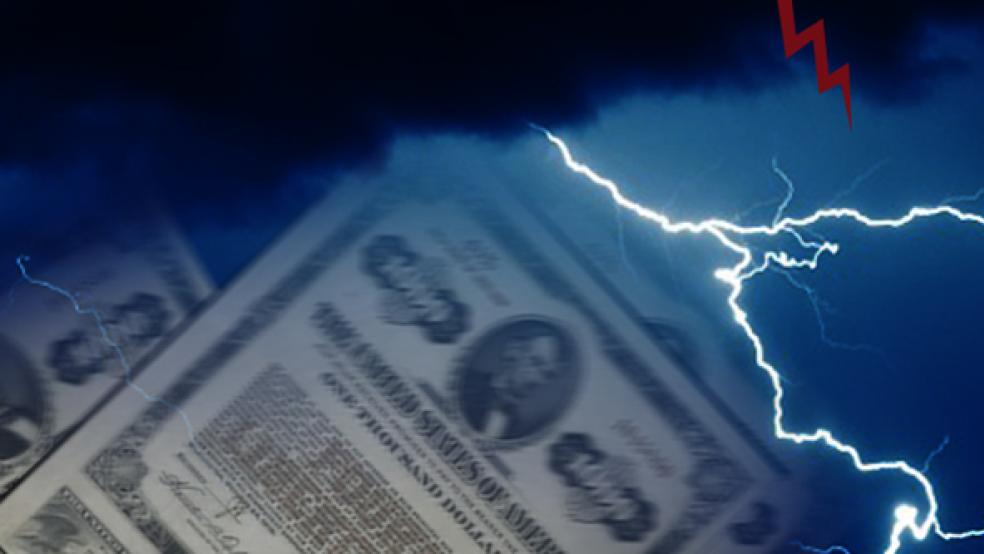U.S. equities are on a rampage as weak economic data lessens the odds of a Federal Reserve interest rate hike this year.
The S&P 500 has climbed for five straight sessions, its best streak of 2015.
Why the sudden surge? The promise of a continuation of the Fed's 0 percent interest rate policy is reviving speculative appetites. Friday's jobs report, which revealed just 142,000 jobs were created last month — below the lowest analyst estimate and well under the consensus expectation of 203,000 — corroborated the recent weakness in regional Fed surveys. The labor participation rate fell as well, dropping to 1977 levels indicating a shrinking labor market. In response, futures market odds for an October or December rate hike dropped hard, as traders now don’t expect a rate hike until March 2016.
But the bulls are overlooking the persistent weakness in the corporate bond market as well as the still-significant risk that the Fed decides to hike rates this year anyway.
Related: Worried About a Recession? Here’s When the Next Slump Will Hit
After the jobs report, St. Louis Fed President James Bullard downplayed the result and reiterated that now was the time to start the process of policy normalization. He added that the mix of employment and inflation is as good as it's ever been, emphasizing the trend in job creation rather than a single soft report.
Fed Vice Chairman Stanley Fischer chimed in with a focus on the fact there are "obvious" bubbles in the economy and that the Fed could go after them with higher interest rates at certain times.
Bank of America Merrill Lynch economist Michelle Meyer doesn't think a December rate hike is off the table yet, but is dependent upon an improvement in the data over the next two months.
Societe Generale Chief U.S. Economist Aneta Markowska told clients that it's difficult to reconcile the weak payroll report and other data (including trade figures) against very strong initial jobless claims and job openings data. As a result, she thinks the jobs slowdown is transitory but sees just a 40 percent chance of a December Fed hike. March only gets a 55 percent chance, with Markowska putting the probability of a hike on or before June 2016 at 70 percent.
Related: The Clearest Sign That the Job Market Hasn’t Really Recovered
Until Fed officials definitively take a 2015 rate hike off the table, the risk remains that the stock and futures markets are going to suffer a painful disappointment later this year. No surprise then that the more measured and mature bond market has been much less ebullient in recent days.
This is why bonds matter: As long as bond prices are weak, the flow of debt-funded corporate buybacks — one of the main sources of stock market buying demand — will be under threat. More simply: Unless bonds perk up too, this stock market rebound will prove short lived.
The Barclays High Yield Bond ETF (JNK) is up 1.7 percent from its Friday low but is still down more than 7 percent from its May high. That's enough to wipe away more than a year and a half of the fund’s dividend payouts.
In higher-rated investment-grade corporate bonds, spreads over U.S. Treasury bonds have widened to two-year highs, thereby raising the cost of buyback financing. The chart above shows how the flow of buyback purchases is sensitive to this relationship between Treasury yields and corporate bond yields.
The bond market weakness, which started in coal names two years ago before moving to overleveraged energy plays, is now infecting a growing swath of the market. It is now taking down names in retail and semiconductors, according to research by Bank of America Merrill Lynch. The chart below shows how the number of corporate bonds experiencing a 10-plus percent price decline is growing, as is the share of non-commodity related bonds.
The analysts have started to wonder whether a turn in the credit cycle is already underway even before the Fed has lifted a finger on short-term interest rates. Corporate earnings are certainly under pressure: S&P 500 earnings are set to decline 4.5 percent in the third quarter vs. last year and are on track to decline in back-to-back quarters for the first time since 2009, according to FactSet data.
Related: 5 IRA Investing Mistakes to Avoid
This sets the stage for an increase in defaults over the next two years, which will further increase corporate bond spreads.
According to Goldman Sachs' estimates, between 2012 and 2015 corporate stock market purchases totaled approximately $1.2 billion, compared to an outflow of $245 billion from households and $175 billion from pension funds. Should more expensive debt financing force CFOs to slow down these purchases, stocks could soon resume their downward slide.
The slowing of corporate purchases comes at a time when stocks are still looking very weak technically. The NYSE Composite tested down to its October 2013 levels last week and threatened a move below its 200-week moving average in August and again in September — a level that hasn't been breached in a big way since 2011.






